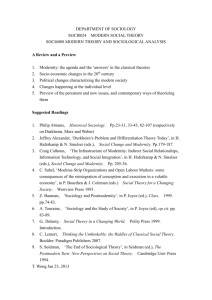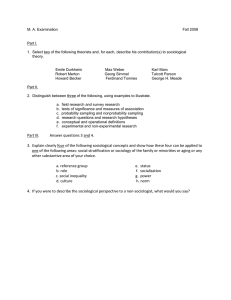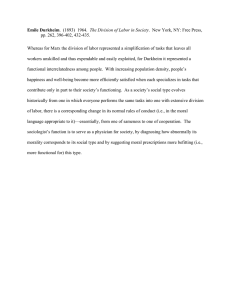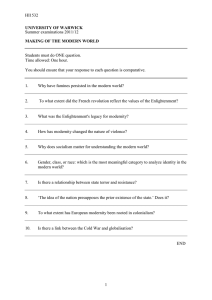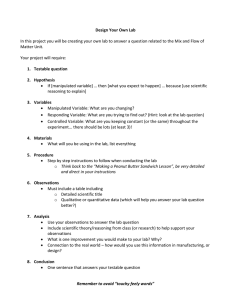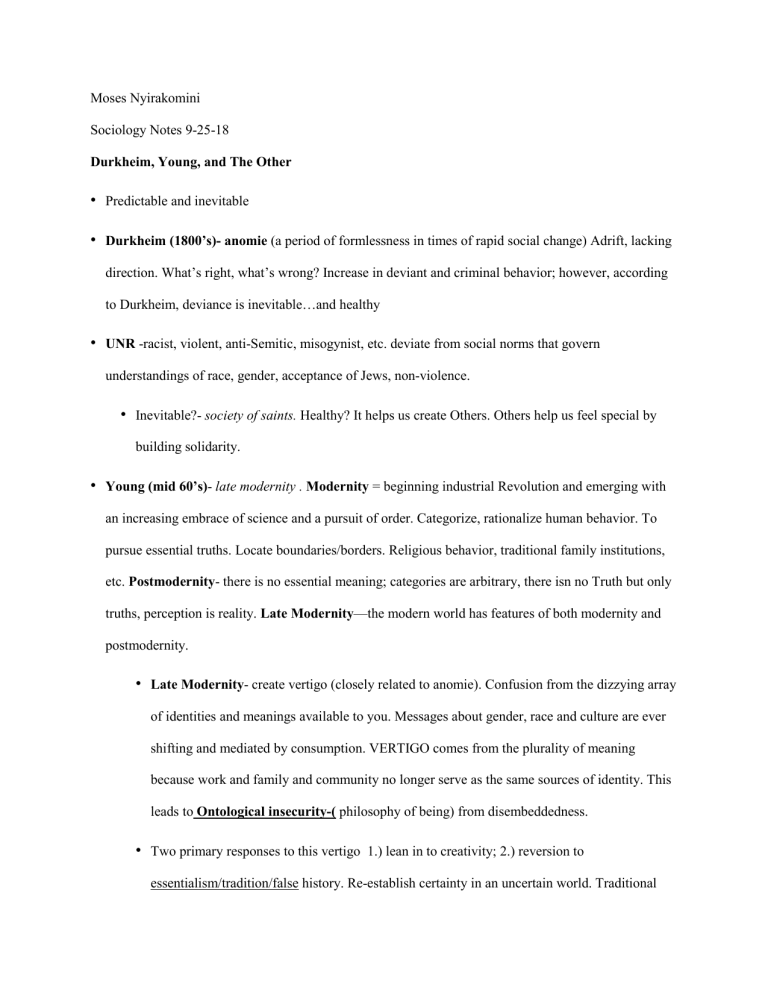
Moses Nyirakomini
Sociology Notes 9-25-18
Durkheim, Young, and The Other
• Predictable and inevitable
• Durkheim (1800’s)- anomie (a period of formlessness in times of rapid social change) Adrift, lacking
direction. What’s right, what’s wrong? Increase in deviant and criminal behavior; however, according
to Durkheim, deviance is inevitable…and healthy
• UNR -racist, violent, anti-Semitic, misogynist, etc. deviate from social norms that govern
understandings of race, gender, acceptance of Jews, non-violence.
• Inevitable?- society of saints. Healthy? It helps us create Others. Others help us feel special by
building solidarity.
• Young (mid 60’s)- late modernity . Modernity = beginning industrial Revolution and emerging with
an increasing embrace of science and a pursuit of order. Categorize, rationalize human behavior. To
pursue essential truths. Locate boundaries/borders. Religious behavior, traditional family institutions,
etc. Postmodernity- there is no essential meaning; categories are arbitrary, there isn no Truth but only
truths, perception is reality. Late Modernity—the modern world has features of both modernity and
postmodernity.
• Late Modernity- create vertigo (closely related to anomie). Confusion from the dizzying array
of identities and meanings available to you. Messages about gender, race and culture are ever
shifting and mediated by consumption. VERTIGO comes from the plurality of meaning
because work and family and community no longer serve as the same sources of identity. This
leads to Ontological insecurity-( philosophy of being) from disembeddedness.
• Two primary responses to this vertigo 1.) lean in to creativity; 2.) reversion to
essentialism/tradition/false history. Re-establish certainty in an uncertain world. Traditional
gender identities. Sex - sexual identity [globalization]. Religious grab bagging. Race - multiracial identities - create mythology of humanity.
• Increasing emphasis on understanding the self with the decreasing certainty and presence of
traditional sources of the ‘self’…plurality leads to creativity or regression.
• Polyamorous unicorns—shifting gender identity based on the person, not external
pressures/expectations. Generation of own community—what’s changing—those communities
are transitory/temporary…those membership qualities have implications.
Sociological Theory
• Theory: a proposition that explains why or how something is happening. Sociological Theories apply
to society and usually both testable and based on prior research support. Theory helps us make sense
of, predict, and even change social phenomena.
• Concepts: “male”, “violence”, “Black”, “gay”.
• Microagression
• Hypothesis: educated guesses about social outcomes. Theory = substantiated hypotheses
+_’why’?/explanation.
• People who consume two alcoholic drinks per day live longer. Stress.
• Falsifiable: you can prove a theory wrong with evidence. Ex: God.
• Good Theory: has empirical evidence, explains a complex issue, can be applied to multiple
settings, is testable, and can be used for prediction.
Levels of Theory:
• Theories have a different range of fact…levels of abstraction.
• Philosophy: no empirical study. All abstract.
• Grand Theory: mostly abstract w/some observation-based generalizations. {anecdotal}
• Middle Range- testable theories that explain social phenomena
• Micro-theory- minimal abstraction- explains small scale interactions.
Deduction and Induction
• Two major approaches for constructing theory
• Deduction- theory developed from a testable set of hypotheses-general to the specific. You pick a
topic, define its scope, review the literature, define your concepts, ask a testable research question
w/ hypothesis, and then test it.
• Rural POC will experience more direct discrimination than urban POC. SURVEY
• Induction: theory that emerges from data analysis. Specific to general. You define broad
questions, collect data, identify patterns, develop a theory, and then compare that theory to the
literature.
• What is the rural racial minority experience? FIELD ETHNOGRAPHY
• The People Problem: it’s really damn hard to theorize about humans cuz we are unreliable and
inconsistent. But, we try. Two big concepts that help us approach an explanation go human
actions
• Agency: people’s capacity to act independently and make their own choice
• Structure- how society’s organization shapes choice.
• The best social research- finds a way to combine them. And they do so b/c that is the essence
of the sociological imagination. One of the major reasons we are different from psych.
Structuration (Giddens)- people live within their structural milieux that constrain their
agency, yet their agent actions can change structural milieux over time.
• Weber’s iron cage of rationalization
• Durkheim Society of Saints: drawing a line in the sand on what’s deemed ethical and unethical. As
generations change and we grow and develop as a society, our ethics change.
Sociology Notes 10-30-18
Symbolic Interaction- the 3rd of the big three. Micro-oriented—society is built from the bottom up.
Focus on individual and group actions that create society = perpetual quest for ‘meaning’. Meaning is
always changing b/c reality is largely a social construct. Meanings have consequences. Suits.
Birkenstocks. Swastika. Trayvon Martin Costume; the costume was trying to convey a message about
young African American males and African Americans in general.
Frankfurt School and Critical theory- interdisciplinary collective of smart people critique capitalism,
but parted ways in some respects from Marx. They critiqued positivism- which they said fails to reveal
deep structures. Commodification- Everything becomes a commodity that can be purchased. ‘Culture
industry’ - free time is commodified to benefit the powerful. ‘Amusing ourselves to death’.
Postructuralism- structuralists hold that society operates according to a set of laws and structures—p/s
question this and examine how humans create those laws. Social reality is always in flux and is infinitely
subjective. Society is built from ‘discourses’ that are always changing. (They become Institutionalized).
Social Institutions- social structures that shape and control our behavior/interactions. Coercive.
• Formal-school, the law (enforced by officials). Truancy
• Informal- custom/taboo. Ex: Entitlement or ownership over someone.
• Organization-physical entity that consolidates norms/values and does work of institution.
[Invisible]
• The Big Four: Education, Media, Family, Work.
• Family-Both Formal and Informal Institution . They have changed/diversified over time. But
primary role is to socialize children. Agents of socialization.
• Primary- Early Childhood, Parents/Caretakers. [Informal]
• Secondary- Around the public.
• Parsons (Structural Functionalist)- ‘Warm Bath’- Family and home is the place where men rest
from their labors. Women start the ‘second shift’ - Physical and emotional needs for the men.
